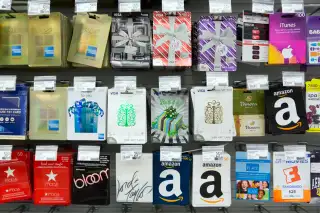Why Gift Cards Are a Crime Against Christmas

Whether you celebrate Christmas, Chanukkah, Kwanzaa, or all or none of the above, the holidays are always about one thing: showing your family and friends how much you care.
That's why the average person spends 14 hours shopping for gifts for their loved ones. That's why kids scrape together $400 to fly across the country to spend Christmas Eve with their cousins in Cincinnati. That's why husbands watch Love Actually.
The holidays are a time to say to your family and friends, "Although you drive me crazy all year round, my life would be empty without you." But that's weird, so you buy your mom a stupid embroidered pillow that says it for you.
Gift cards, on the other hand, aren't about any of that. Gift cards are about efficiency. Gift cards are about corporate profit. Gift cards degrade the entire exercise of gifting. (Unless you are my colleague Jake Davidson, whose impassioned defense of this deplorable practice you can read here.)
A gift card says, "I couldn't be bothered to think of you this holiday season; help yourself to exactly $25 worth of crap from Target."
Gift cards are a crime against Christmas.
Let's start with the basic etiquette problem. The first rule of gift giving is, don't say how much you paid for your gift. Simple. So why get a gift receipt for one person, then hand the next person a gift card emblazoned with the exact amount of money you spent? You've just put a definitive monetary value on your relationship. When did we decide this was an acceptable social practice?
I know, I know—it's hard to find thoughtful gifts for everyone on your list. But don't think your friend will do a better job. It's even more difficult for people to give good gifts to themselves. Here's why: Researchers have found that when people are given "play money" like gift cards, they're more likely to spend it on stuff they don't need. In fact, they're more likely to overspend. CEB Towers found that 65% of gift card users spend 38% more than the value of the card.
Alternatively, your gift card may sit, unused, in your loved one's wallet or junk drawer. Industry insiders call this "spillage," and companies can count on American consumers to spill almost $1 billion in gift card balances this year. Believe it or not, that's down 88% from what it used to be, before Congress passed the Card Act, which put limits on expiration dates and inactivity fees.
And what happens to the money on unwanted gift cards? Obviously the retailer profits, but the Wall Street Journal has also reported that states in dire financial straits have tried to seize the value of unused gift cards using statutes that allow states to collect "abandoned property." (You can check your state's laws here.) In other words, buy a Target gift card that your friend never uses, and you've essentially given a gift to Target and/or your governor.
The worst are the general-purpose cards that you can spend anywhere. First of all, why didn't you just give cash? Second, these "gift cards" aren't actually gift cards in a legal sense. They're prepaid debit cards, and they're not subject to the same consumer protections as either gift cards or real credit cards. That means general purpose cards can come loaded with activation fees, inactivity fees, and other fees that degrade the value of the card.
And finally, if you go through all the hassle of finding a personalized gift for your loved one and then he doesn't like it—so what? The act of giving is an act of affection. It's not meant to be an efficient way of allocating goods. The Three Wise Men gave baby Jesus gold, frankincense and myrrh. Did a new mother, her betrothed, and the infant Son of God really need aromatic resin as they were fleeing persecution? Probably not. But that's why the Three Wise Men were wiser than you.